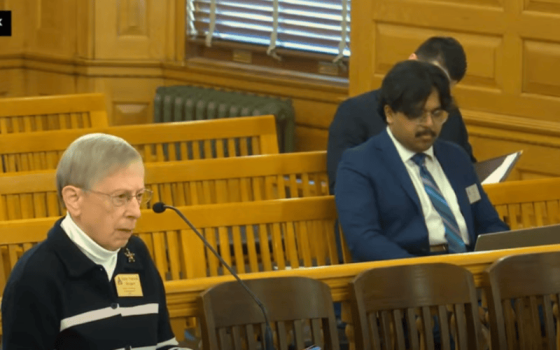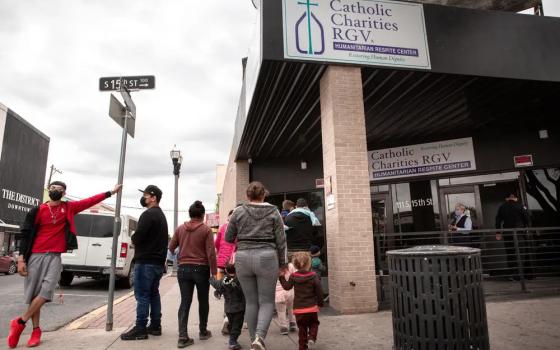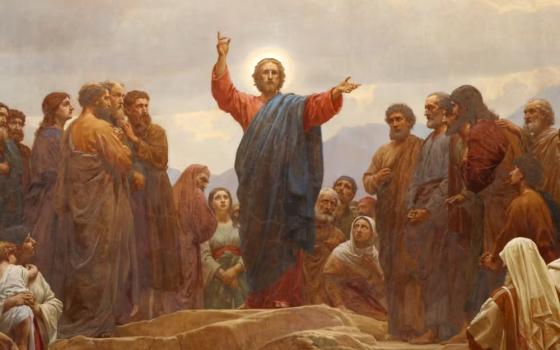
Bishop Robert W. Finn of the Kansas City - St. Joseph diocese Feb. 4 warmly greeted visitors to a two day diocesan Immigration conference, in a homily linking U.S. abortion and immigration laws, saying both are unjust and require change.
During a conference opening mass, he explained the biblical mandates which have moved him to support immigration reform and open his arms and heart to the undocumented.
"Dear friends, so many times I have been told by good people concerning undocumented brothers and sisters, “Bishop they are breaking the law. How can you support them when they are breaking the law?” You and I love and respect the law. We do not easily absolve ourselves from its expectations. As responsible citizens we must also ask at all times, Is the law just? Can we do better to protect good order of society and at the same time support the basic needs and human aspirations of people not unlike ourselves?
"I love the unborn and I have many times spoken and acted, peacefully and prayerfully, in the defense of their most fundamental right to life. They are not affirmed as human persons in our country’s law. We will never rest until that injustice is reversed. We ought not to be satisfied with the present circumstance of the undocumented migrant until our leaders work harder to reform immigration in our country. The law of human dignity, and the integrity and protection of families, must be able to live side by side with meaningful border controls and a responsible and obtainable path to citizenship. Immigration reform is a volatile issue in our country and, true enough, elected officials are caught in the divide. But we must be willing to work hard in support of meaningful reform. It will require the good will of both political parties, and it will require an expanded vision."
The full text of Bishop Finn's remarks follow:
Homily for Immigration Conference
Friday, February 4, 2011 – St. Francis Xavier Parish
Most Reverend Robert W. Finn
Bishop of Kansas City-St. Joseph
Dear friends in Christ,
In our first reading tonight, from the Letter to the Hebrews, we are reminded, “Do not neglect hospitality, for through it some have entertained angels.” (Hb 13:2) This evening it is a joy for me to welcome His Excellency Bishop George Murry of Youngstown Diocese in Ohio. I hope that the warmth of our hospitality will balance the snowy and cold weather here in Kansas City.
I have had the privilege of working with Bishop Murry over the last years, particularly during our time together on the Bishops’ Committee on Priority and Plans. Bishop Murry chaired that group and oversaw a significant work in the reorganization of the Conference. At the time I chaired the Bishops’ Task Force on the Life and Dignity of the Human Person. We were writing a strategic plan to more effectively draw together various agencies of the Bishops’ Conference around common goals. One fruit of that work was the interaction of the Pro-Life Secretariat, the Committee on Domestic Justice and Human Development, and the Bishops Committee on Immigration, during the Health care debates. As is sometimes the case, our efforts were not as successful as we hoped, but we nonetheless achieved a meaningful solidarity in speaking with one voice.
I also wish to welcome our friends and co-workers from the Archdiocese of Kansas City, Kansas, and of course, all of our guests.
The Scripture’s call to hospitality has a particularly poignant application for our reflection in this teaching conference on the Church’s principles concerning the care of migrant people. You recall the Old Testament account of Abraham welcoming the three mysterious visitors, Angels of the Lord, the foreshadowing of the Trinitarian Godhead. His hospitality, to which the Letter to the Hebrews refers, was rewarded with an heir. The venerable Patriarch and his aged wife Sarah were given the gift of a son, Isaac, child of the Promise, and a type and image of the Eternal Son, Jesus Christ.
Abraham passed God’s test. He welcomed the strangers, realizing as did the Bedouins of the day, that to neglect to do so was to abandon fellow wayfarers to be consumed by the desert. More than providing minimal shelter, Abraham and Sarah receive the visitors warmly as friends. Though they were different and unknown, the guests were received as valued persons.
In the New Testament Jesus Christ again and again affirms this connectedness between us as brothers and sisters. “What you do for the least of my brothers and sisters,” He insists, “you do to Me.” (Mt 25:30) Set in the imagery of the Final Judgment, this is God’s test for us. In the account of Saul’s conversion, the risen Jesus speaks from heaven, “Saul, Saul, Why do you persecute Me?” (Acts 9:4) Jesus identifies Himself as one with the disciples under attack. The clear teaching is that every person has a God-given dignity, and inestimable and irrevocable value as a son or daughter of the Eternal Father – as one identified with Christ Himself – regardless of race or language or nationality or status. All are ennobled as part of Christ; as“Alter Christus,” “other Christs;” or as one modern day saint insists “Ipse Christus,” “Christ Himself.” What we do; what we fail to do – This is for Christ.
This deep truth of our faith must color and guide our acts in solidarity with one another. This belief tells us how to look at each other. The work of justice is broad and directed toward the good order of society. Let us affirm the prerogative and responsibility of nations to set laws to maintain their sovereignty, and to define the rights and responsibilities of citizenship. At the same time this mystery of the innate goodness of each person – requires us to put hatred and suspicion aside as we encounter the migrant.
Again, in the Letter to the Hebrews the author bids us to look deeper than we might be inclined. “Be mindful of prisoners,” he writes, “as if sharing their imprisonment, and of the ill-treated as of yourself, for…” he reminds us, “you also are in the body.”
Dear friends, so many times I have been told by good people concerning undocumented brothers and sisters, “Bishop they are breaking the law. How can you support them when they are breaking the law?” You and I love and respect the law. We do not easily absolve ourselves from its expectations. As responsible citizens we must also ask at all times, Is the law just? Can we do better to protect good order of society and at the same time support the basic needs and human aspirations of people not unlike ourselves?
I love the unborn and I have many times spoken and acted, peacefully and prayerfully, in the defense of their most fundamental right to life. They are not affirmed as human persons in our country’s law. We will never rest until that injustice is reversed. We ought not to be satisfied with the present circumstance of the undocumented migrant until our leaders work harder to reform immigration in our country. The law of human dignity, and the integrity and protection of families, must be able to live side by side with meaningful border controls and a responsible and obtainable path to citizenship. Immigration reform is a volatile issue in our country and, true enough, elected officials are caught in the divide. But we must be willing to work hard in support of meaningful reform. It will require the good will of both political parties, and it will require an expanded vision.
The principle of reciprocity teaches us what we already have come to know as a country of immigrants: that we are stronger because of diversity. New cultures, rich in faith and family, truly bring a gift to our communities. They give as much as, and often more than, they receive. They share the image of God. They remind us who we are; they reveal to us the universality of God’s family.
These hours today and tomorrow, dear friends, are an opportunity for purposeful dialogue on the Church’s authentic social doctrine and the principles that animate justice and charity.
May the Holy Spirit help us to reach greater unanimity from many languages, cultures, and points of view. Mary, Mother of us all, and Queen of all Nations, assist us in finding a safe path to peace.




